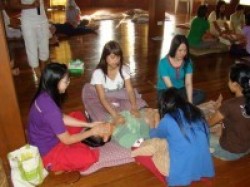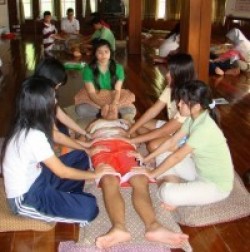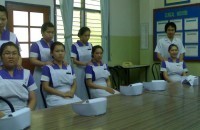Reiki articles about Nursing and Research
Enhancing Nursing Practice with Reiki
by Kathie Lipinski, RN, MSN
As a Reiki Master Teacher, Nurse Massage Therapist, and Holistic Nurse in private practice, my experience has shown that Reiki enhances all nursing skills.
Reiki enhances both nursing care and judgement in a hospital, private practice, administrative, managed or home care setting.
Nurses have always been known to have a sixth sense or what many refer to as "Nurses’ Intuition."
It is that ability to "know" when to check on a patient,
to call a family when a patient is not doing well,
to have a doctor recheck a patient,
to call or visit a home care client when a visit wasn’t planned "just because" you had a feeling,
or recheck paperwork.
Reiki training enhances this ability to "know" or "sense" things or be more aware of subtle signs.
Because Reiki comes from the source,
the nurse never has to worry about depleting his or her own energy.
Working with energy is another way of gathering information on a deeper level.
It gives one "subtle clues" as to what is really going on with a person.
It helps one to become more aware of the emotional or spiritual component of dis-ease that the nurse can share with the client to gain understanding or insight.
This insight fits with the nurses’ role of helping a person to understand and learn more about their health or illness and to provide guidance to change behavior and increase awareness.
Reiki training makes a nurse more aware of subtle energies – physical, mental, emotional and spiritual. This subtle energy phenomenon is known to Nurses as the "Human Energy Field".
Reiki enhances Therapeutic and Healing Touch techniques since it is an energy source in itself.
It helps the nurse to protect herself from picking up negative energies or vibrations from the person she is working with. Because Reiki comes from the source, the nurse never has to worry about depleting his or her own energy.
Reiki treats both practitioner and client.
The most important benefit of Reiki is the self-care aspect.
With all the energies that a nurse has to give in caring for others, a nurse often suffers "burn out."
Reiki is an excellent way for nurses to take care of themselves and restore their energy and avoid depletion.
Reiki has helped me fine tune my clairvoyance so that I can "see" the emotional component behind the dis-ease or emotional turmoil.
It has enhanced my touch so that my hands are more sensitive to the muscle state.
Reiki has taken me from traditional nursing to a more holistic model where deeper healing is addressed through the use of subtle energies.
Many of my Reiki students and friends who are nurses often tell me about the ways they use Reiki.
Some use Reiki energy to help them more easily locate a vein when inserting an intravenous line (IV). Others give their patients Reiki while taking their blood pressure or pulse.
The patient’s often reply that they feel "something special" or feel more relaxed.
It is amazing what just a few minutes of Reiki can do.
Home care nurses use Reiki in physical and psychological assessments, changing dressings, paper work, health care teaching and working with family members.
Recovery room nurses report using Reiki over the incision site of painful areas and find patients have an easier time waking up or recovering from anesthesia and surgical trauma.
Emergency room nurses use Reiki to calm patients down quickly and to be more open to treatment.
They find that Reiki also calms down family members.
Dr. Nancy Eos explains in her book "Reiki and Medicine" how she uses Reiki to help her decide which person needs to be seen first (triage).
Nurses in administrative or management positions use Reiki when doing stressful tasks such as staffing, counseling, and reviewing employees.
Reiki calms the situation, and creates a more receptive state and clearer thinking.
Some managers and staff give themselves Reiki before and during a staff meeting and find the meeting goes smoother.
Nurses in private practice tell me how Reiki enhances their hypnotherapy skills, guided imagery exercises, their work as a dula in Labor and Delivery, and massage sessions, etc.
As nurses’ roles continue to change and expand, Reiki is there to assist in their professional development. Reiki assists nurses in caring for themselves and restores their energies so they can continue to give of themselves in their role as health care advocates.
Nurses who practice Reiki are in the unique position to combine both Reiki and their strong medical knowledge to help clients and improve the health care system.
Kathie Lipinski is a Center Licensed Teacher of Usui Reiki and Karuna Reiki®.
She is a Healing Touch Practitioner and Nationally Certified Massage Therapist. Kathie has six years experience working with Reiki and other energy based healing techniques.
She is a Registered Nurse, Massage Therapist, Teacher of Massage Therapy and lives in Louisville, Kentucky. Please contact Kathie Lipinski, RN, MSN. E-Mail - [email protected]
NOTE: Exciting times are ahead. We are collecting information on how Reiki is used in hospital settings and nursing practices to be included in a Reiki nursing manual.
Please send us your Reiki stories.
More on . . . Reiki and Nursing
By Kathie Lipinski, RN, MSN
Since writing the article on Reiki and Nursing in the Fall 1997 issue,
many nurses across the country (as well as England and Australia too!)
have written me regarding the use of Reiki in their nursing practice.
This article will provide other suggestions as to how Reiki can be incorporated
into daily practice as well as current issues facing nurses today.
The most important way that Reiki can be brought to any nursing practice is
by beginning your day with it.
That may be upon awakening, beginning your shift, preparing the room(s) where you work,
or preparing for your first home visit.
Take a few minutes in your car, in the locker room, sitting at your desk, or at home.
First, visualize or draw the distant healing (absentee) symbol, invoke its name,
let the energy flow through you and ask, "How can I best serve today?"
Remember to be still.
Listen and feel the Reiki flow.
Then invoke the mental emotional symbol and the power symbol to help balance you
physically, mentally, and emotionally.
Taking a few minutes at the start of your day can make a tremendous difference in how your day flows.
Another way to prepare for your working day is to place all the symbols physically (by drawing them with your fingers) or mentally (visually) in the room (such as ICU, CCU, RR, Dialysis unit, etc.), the office, your car, or wherever you do your work.
This helps to calm the atmosphere and promote the highest outcome for all involved for the day.
Nurses that work in endoscopy units, diagnostic labs, and recovery rooms, have told me how putting the symbols in the room before they begin their day calms everyone down and promotes a relaxed and peaceful feeling.
Patients seem to do better (less bleeding, quicker recovery, less pain) when Reiki is used.
Many doctors and other health care practitioners often remark how patients always do better when that nurse is on duty, or "I don’t know what you’re doing but keep doing it."
All verification that Reiki does work.
When passing medications, a nurse can draw (or visualize) the Reiki symbols over the cart, the tray, or the individual medication and say, "let this medication be raised to its highest vibration so that those who receive it will be comforted and healed with minimal side effects."
This applies to radiation therapy and chemotherapeutic medication as well.
Placing the symbols on diagnostic equipment or surgical instruments before the procedure can also promote a better outcome.
At meetings, one can use the symbols during the meeting to promote openness, calmness, and understanding. One can also "beam" Reiki to the person speaking, or a person "on the hot seat," to help them speak clearly, keep calm, and be open to the issues being discussed.
Those are just a few ways that Reiki can be used in nursing practice.
A more important issue currently facing nurses is what is happening regarding energy work and how it falls within the scope of nursing practice.
Many nurses have contacted their state boards of nursing to find out if Reiki and other modalities such as Healing Touch and Therapeutic Touch are included within the nurse practice act in their state.
Much of this is because nurses are expanding their roles in private practice;
are concerned about liability;
are attempting to bring Reiki into hospital settings;
are held to different standards than the lay person doing Reiki;
and, hospitals are incorporating integrative medicine programs such as alternative therapies to promote their business.
It is important to find how Reiki fits into the scope of nursing practice in your state.
Several nurses have developed "organizations" to help define the use of Reiki and other touch therapies in nursing practice.
One reason this has come about is that other organizing bodies are trying to regulate touch therapies.
One example is in Louisiana, the AMTA (American Massage Therapy Association) is lobbying to enact legislation to keep nurses from practicing touch therapies without a massage license.
This would mean that they could set standards for nurses and tell us how to practice.
Only nurses should regulate nursing practice and I urge you to get in contact with the RN Reiki Connection. Membership is $25 per year.
It is a great networking organization and you can find out what is going on nationally with other nursing groups.
You can contact:
Marion Yaglinski, RN, RN Reiki Connection, 1248 Hunt Club Land Media, PA 19063
e-mail: [email protected]
There is talk of developing a "core curriculum" for nurses practicing and teaching Reiki.
Although Reiki is a spiritual practice and many of us are against
"standardization and organization" of this simple healing modality, we may need to do this to bring Reiki into the traditional medical model.
The use of the nursing process is a great way to start.
There is now an official nursing diagnosis, "Energy field disturbance," that we can use.
I believe that Reiki is guiding us in its wisdom to this so that we can bring it into traditional medicine and health care settings. I trust the Reiki energy to guide us in this process.
Just as Reiki guided us to its true roots in Japan, I believe that Reiki is reaching out to all aspects of society so that healing can be brought to all, and ALL Reiki practitioners will benefit as well.
Let your voice be heard concerning your nursing practice.
With Reiki being the spiritual practice that it is, our role as nurses is to bring this beautiful gift to the traditional medical world in the best way we know how.
With our feet in traditional and nontraditional therapies, we are the bridges.
With Reiki guiding us, we can build them—then cross them.
Kathie Lipinski, RN, MSN Center Licensed Master Teacher
Go to page Session fees
Go back to Reiki energy massage
To contact us, click here !



